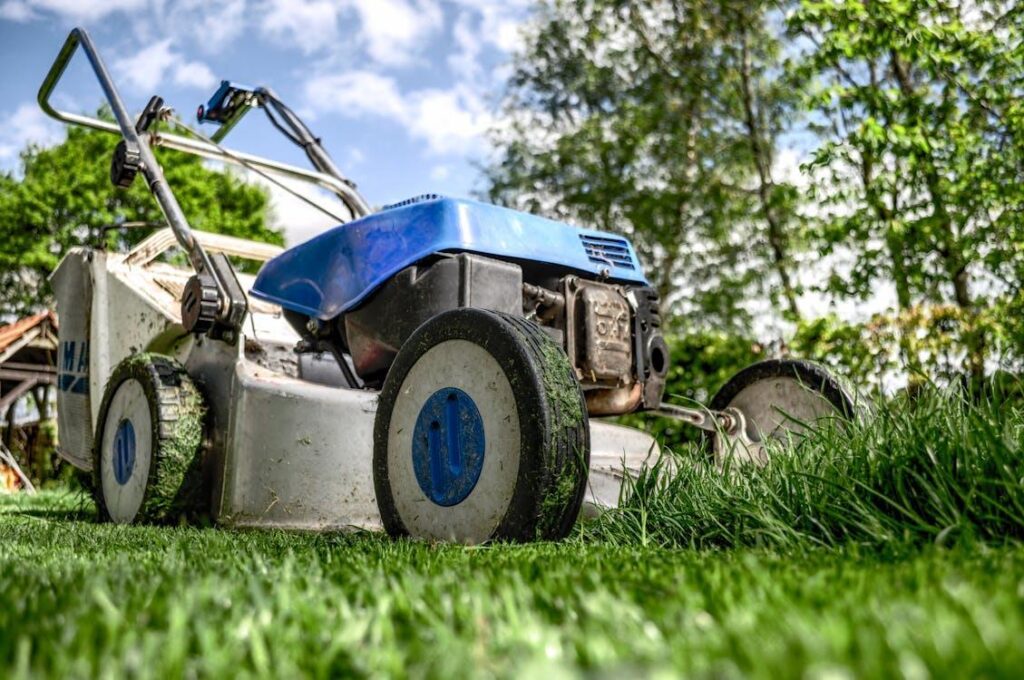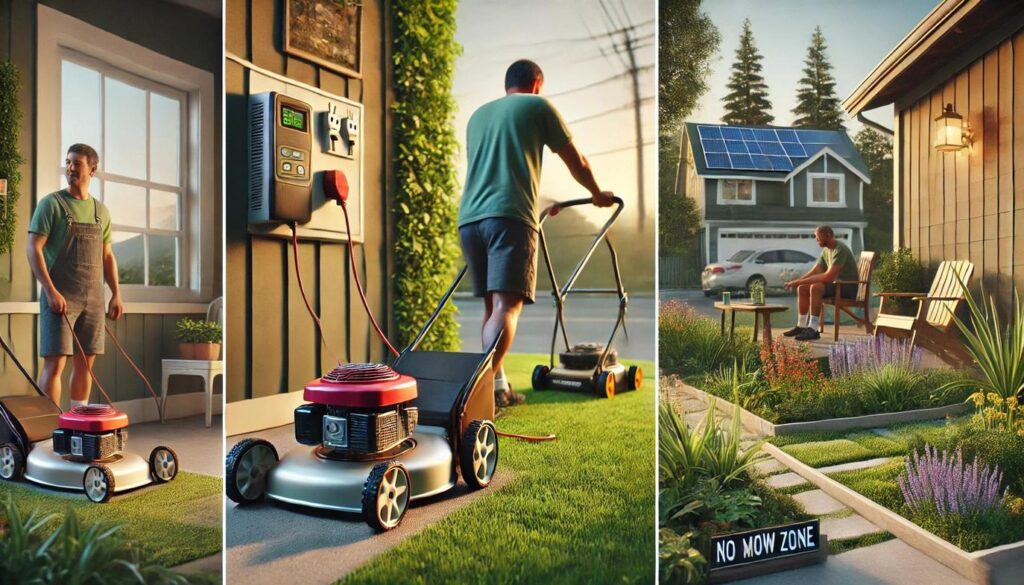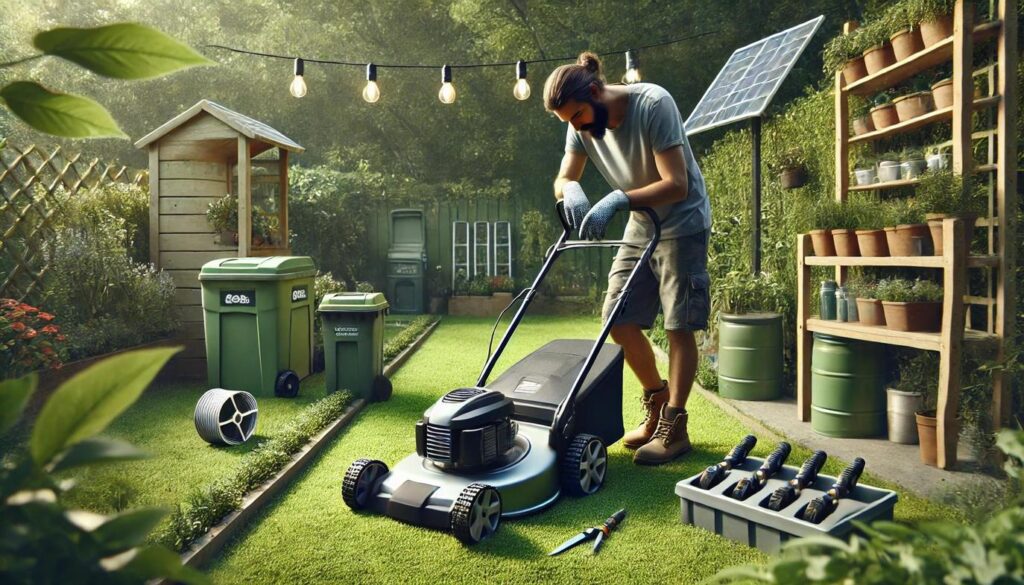Lawnmowers are a staple in many homes, helping us maintain neat yards. Yet, many are unaware that these routine garden tools can adversely affect our environment.
From air pollution to high fuel consumption, traditional gas-powered mowers contribute to several ecological issues. They release harmful gases, consume valuable resources, and create noise pollution, all of which contribute to local environmental degradation.
With growing awareness of eco-friendly lawn care, rethinking your lawn maintenance strategy is essential. Fortunately, there are ways to make your lawn mower more eco-friendly without sacrificing performance or efficiency.

Why Choose Electric Instead of Gas-Powered Mowers?
Gas-Powered Lawn Mowers and Air Pollution
Gas-powered lawnmowers, which are the most common, are among the worst culprits when it comes to air pollution. A gas-powered lawn mower emits as much pollution in one hour as driving a car for over 200 miles.
The small engines in these mowers are inefficient and release harmful chemicals such as carbon monoxide, hydrocarbons, and nitrogen oxides. These pollutants not only contribute to smog and poor air quality but also have negative health impacts on humans. If you’re concerned about air pollution, switching to a cleaner alternative can significantly reduce your environmental impact.
How to Choose a Greener Lawn Mower
If you have a small yard, a push mower or a reel mower could be a perfect option. These manual mowers require no fuel or electricity and are a great way to reduce your environmental impact. For larger yards, an electric mower may be the best choice, as it offers more power than a push mower without the harmful emissions of a gas mower.
When choosing a greener lawn mower, it’s important to think about both performance and environmental impact, and models like Worx cordless lawn mowers or other battery-powered alternatives offer excellent power with zero emissions, making them an ideal choice for eco-conscious homeowners. Think about models with features like mulching capabilities, which allow you to reuse grass clippings and reduce waste.

How Does Gas Mower Fuel Efficiency Affect Our Lives?
Emissions of Gas Mowers: What You Need to Know
The carbon footprint of lawnmowers is another area where you can make a difference. The production, transportation, and use of gas-powered mowers contribute to global warming by emitting carbon dioxide (CO2), a greenhouse gas.
Each time you start your mower, you are adding CO2 to the atmosphere, contributing to climate change. While it might seem like a small contribution, when you multiply it by the millions of mowers in use worldwide, it becomes clear that this is a significant problem. Reducing or eliminating the use of gas-powered mowers is an effective way to cut your carbon footprint.
Reducing Gasoline Use in Lawn Care to Lower Costs and Pollution
While the fuel consumption of lawnmowers may seem insignificant at first glance, it can add up quickly throughout the mowing season. Many homeowners, who mow their lawns every week, may end up using several gallons of gas each month.
A traditional gas-powered mower uses about a gallon of gas per hour of operation, leading to substantial fuel consumption over an entire year, which can reach staggering amounts. This not only increases your carbon footprint but also contributes to the depletion of fossil fuels.
The High Cost of Fuel Consumption in Lawn Care
Gasoline is a non-renewable resource, and its extraction, transportation, and combustion have a high environmental cost, causing habitat destruction and pollution.
In addition to its ecological impact, the fluctuating price of gasoline takes a toll on your wallet. By reducing fuel consumption in lawn care, you can lower your carbon footprint, save money, and help preserve precious fossil fuels for future generations.
Making mindful choices in your mowing practices can lead to a more sustainable approach to lawn care, benefiting both the environment and your finances.
How Can I Practice Green Lawn Care?
The Benefits of Electric Lawn Mowers
Electric lawnmowers, both corded and battery-powered, provide a much more environmentally friendly alternative to their gas-powered counterparts. These mowers do not emit any harmful gases or pollutants, making them a cleaner choice for air quality.
Battery-powered electric mowers are particularly beneficial because they can be recharged and used for multiple seasons, which reduces the need for new materials and manufacturing. Although they may have a higher initial cost, electric mowers have lower operational costs over time and last longer, making them a smart investment for the eco-conscious homeowner.
Maximize Efficiency: Maintaining Your Lawn Mower
Proper maintenance of your lawn mower is another way to reduce its environmental impact. A poorly maintained mower can consume more fuel and emit more pollutants than a well-maintained one. Regularly change the oil, clean the air filter, and sharpen the blades to keep your mower running smoothly.
If you have a gas-powered mower, using the correct grade of oil and fuel will also secure optimal performance. You can also think about using biodegradable oil or synthetic oil, which are less harmful to the environment. By taking care of your mower, you not only extend its lifespan but also make sure it operates efficiently, reducing its overall environmental footprint.

Are There Ways to Decrease Yard Maintenance Needs?
Addressing Lawn Mower Noise Pollution
Another environmental concern with lawnmowers is noise pollution. Gas-powered mowers are notoriously loud, and the noise can be disruptive not only to your neighbors but also to local wildlife. Prolonged exposure to loud noise can lead to hearing loss in humans, and it stresses out animals that rely on a quiet environment for communication and survival.
If you’ve ever tried to enjoy the outdoors on a peaceful day only to be interrupted by the roar of a lawn mower, you know how jarring it can be. Opting for quieter alternatives can help reduce noise pollution and make your yard a more pleasant place to be.
Low-Maintenance Landscaping: Xeriscaping and Native Plants for Sustainable Lawn Care
If you’re committed to reducing your environmental impact, think about alternatives to traditional lawn mowing altogether. One option is to replace your lawn with native plants or ground covers that require little to no maintenance. These alternatives are better for the environment, as they provide habitats for local wildlife and reduce water consumption.
Xeriscaping, or landscaping with drought-tolerant plants, is another option that reduces the need for mowing and watering. By making the switch to low-maintenance landscaping, you can eliminate the need for a lawn mower, helping both the environment and your water bill.

Electric Mowers, Sustainable Practices, and Biodiverse Landscaping
As homeowners become more aware of their environmental impact, the need for sustainable lawn care solutions has never been more pressing. Transitioning to eco-friendly mowing practices not only helps reduce pollution and carbon footprints but also fosters healthier green spaces.
Sustainable Lawn Care Solutions and Eco-Friendly Mowing Practices
Making environmentally friendly choices in lawn care is crucial in mitigating our impact on the planet.
Opt for electric or manual mowers to:
- Significantly reduce pollution.
- Lower your carbon footprint.
Implement simple steps for sustainable outdoor maintenance, such as:
- Reusing grass clippings to enrich soil.
- Considering alternatives to traditional lawns, like native plants or xeriscaping.
Increased Awareness Leads to Better Lifestyle Decisions
With increased awareness of how our daily actions affect the environment, it’s essential to embrace greener solutions in lawn care. By making informed choices and advocating for eco-friendly practices, we can foster healthier environments and promote biodiversity, ensuring our green spaces thrive for generations to come.

Eco-Friendly Lawn Care FAQs: Electric Mowers vs. Gas, Push Mower Benefits, and Sustainable Landscaping Alternatives
1.Are electric lawn mowers more efficient than gas mowers?
Yes, electric lawn mowers are generally more energy-efficient and produce zero emissions, making them a greener option for maintaining your lawn.
2.What are the benefits of using a push mower?
Push mowers, or reel mowers, are manual alternatives that don’t require fuel or electricity. They reduce environmental impact and can provide a good workout.
3.How often should I maintain my lawnmower?
Regular maintenance is essential. It’s recommended to check oil levels, clean air filters, and sharpen blades before each mowing season and at regular intervals throughout the year.
4.Can I use lawn clippings as mulch?
Yes, mulching lawn clippings helps return nutrients to the soil and reduces waste. Many mowers come equipped with mulching features to make this easier.
5.What landscaping alternatives reduce mowing needs?
Native plant gardens and xeriscaping are excellent alternatives that require less maintenance, helping conserve water and providing habitats for local wildlife.




